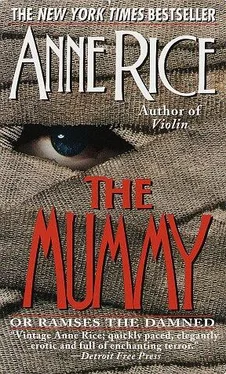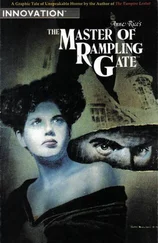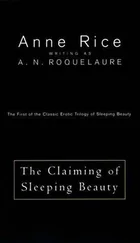He snatched it from her and drained it immediately. He gave her a nod and smile.
"Egyptians love beer, Rita. Get some more, hurry."
Keeping Rita on the go was keeping Rita from losing her mind.
Julie made her way through the ferns and potted trees and took her place at the table opposite Ramses. He glanced up, then pointed to a picture of "the Gibson girl" before him. Julie nodded.
"American," she said.
"United States," he responded.
She was stunned. "Yes," she said.
He quickly devoured a sausage whole, and folded another thin slice of bread and ate it in two bites, as he turned the pages with his left hand, scanning a picture of a man on a bicycle. This made him laugh out loud.
"Bicycle," she said.
"Yes!" he said, precisely as she had said it a moment ago. Then he said something softly in Latin.
Oh, she had to take him out, show him everything.
The telephone sounded suddenly, a shrill ring from Father's desk in the Egyptian room. He was immediately on his feet. He followed her into the Egyptian room and stood quite close, looking down at her as she answered it.
"Hello? Yes, this is Julie Stratford." She covered the mouthpiece. "Telephone," she whispered. "Talking machine." She held the receiver so that he might hear the voice on the other end. Henry's club calling; they would come round for Henry's trunk. Could she have it ready?
"It's ready now. You'll need two men, I should think. Please do hurry."
She clasped the wire and held it up to Ramses' attention. "The voice goes through the wire," she whispered. She hung up the telephone, looked about. Taking his hand, she led him back into the conservatory, and pointed to the wires outside, which ran from the house to the telegraph pole at the far end of the garden.
He studied all this with keen concentration. Then she took an empty glass from the table and approached the wall that divided the far end of the conservatory from the kitchen. She placed the mouth of the glass against the wall and pressed her ear to the bottom of the glass, and listened. It amplified the sound of Rita moving about. Then she invited him to do it. He heard the amplification just as she had heard it.
He stared at her, thoughtful, dazzled, excited.
"The wire of the telephone conducts sound," she said. "It's a mechanical invention." That's what she must do, show him what machines were! Explain the great leap forward which machines had accomplished; the complete transformation of thinking about how to do things.
"Conducts sound," he repeatedly thoughtfully. He moved to the table and lifted the magazine he'd been reading. He made a gesture as if to say Read aloud. Quickly, she read a paragraph of commentary on home affairs. Too dense with abstractions, but he was merely listening to the syllables, wasn't he? Impatiently he took the magazine from her, and then answered:
"Thank you."
"Very good," she said. "You're learning with amazing speed."
Then, he made a curious little series of gestures. He touched his temple, his forehead, as though making some reference to his brain. And then he touched his hair, and his skin. What was he trying to tell her? That the organ of thought responded as quickly as his hair and body had responded to the sunlight?
He turned to the table. "Sausages," he said. "Beef. Roast chicken. Beer. Milk. Wine. Fork. Knife. Napkin. Beer. More beer."
"Yes," she said. "Rita, bring him some more beer. He likes
beer." She lifted a fold of her peignoir. "Lace," she said. "Silk."
He made a little buzzing noise.
"Bees!" she said. "Exactly. Oh, you are so wonderfully clever."
He laughed. "Say again," he said.
"Wonderfully clever." Now she pointed to her head, tap, tap, tap. The brain, thought.
He nodded. He glanced down at the silver-handled paring knife on the table. He picked it up, as if asking her permission, and slipped it into his pocket. Then beckoning for her to follow, he went into the Egyptian room. He approached an old dim map of the world behind a dusty glass in a heavy frame and he pointed carefully to England.
"Yes, England. Britannia," she said. She pointed to America. "The United States," she said. Then she identified continents, oceans. Finally she identified Egypt, and the Nile River, a tiny line on this small map. "Ramses, King of Egypt," she said. She pointed to him.
He nodded. But he wanted to know something else. Very carefully he articulated the question:
"Twentieth century? What means anno Domini?"
She was speechless, looking at him. He had slept through the birth of Christ! Of course he had no way to grasp how long that sleep had lasted. That he was a pure pagan did not disturb her so much as it fascinated her. But she feared the shock she would give him now when she answered his question.
Roman numerals, where was that book? She took down Plutarch's Lives from her father's shelves and found the date of publication in Roman numerals, only three years before, perfect.
Taking a sheet of notepaper from her father's desk, and dipping his pen, she hastily wrote out the correct date. But how to make it known to him the beginning of the system?
Cleopatra was close enough, but she feared to use Cleopatra's name, for all the obvious reasons. Then the clearest example came to her.
She wrote out in hand, printed letters the name Octavius Caesar. He nodded. She made a Roman numeral one beneath it. Then she drew a long horizontal line, moving to the very right edge of the page, and she wrote her own name Julie, and the full date in Roman numerals. And after that the Latin word: annum.
He blanched. He looked at the paper for a long time, and then the color appeared to dance in his cheeks. There was no doubt he understood her. His expression became grave, then curiously philosophical. He seemed to be pondering rather than absorbing a shock. She wrote the word century, and then the Roman numeral for one hundred, and the word annus. He nodded a little impatiently, yes, yes, he understood.
Then he folded his arms and walked slowly around the room. She could not guess what he was thinking.
"A long time," she whispered. "Tempus . . . tempus fugit!" She was embarrassed suddenly. Time flies? But it was all the Latin she could think of. He was smiling at her. Was it a clich6 two thousand years ago?
He approached the desk, and leaning over her gently, he took the pen and carefully drew the Egyptian cartouche which spelled his name in hieroglyphs, Ramses the Great. Then he too drew a horizontal line stretching across the page almost to the edge, where he wrote Cleopatra. In the very middle of that line he wrote the Roman numeral M meaning one thousand years; and then the Arabic numbers for it which she had only taught him an hour ago.
He gave her a moment to read this. And then he wrote beneath his cartouche the Arabic numerals 3000.
"Ramses is three thousand years old," she said, pointing to him, "and Ramses knows it."
He nodded again, and smiled. What was his expression? Sad, resigned, merely thoughtful? There was a great dark flicker of pain in his eyes. The smile did not break, but she saw it, and she saw a subtle puckering of the lids beneath his eyes as he pondered this himself, and apparently moved back from it emotionally. He looked about the room now as if he were seeing it for the first time. He looked at the ceiling, and then at the floor, and then directly at the bust of Cleopatra. His eyes were as wide as before, his smile as soft and agreeable, but the something was gone from his face. The vigour. It had completely vanished.
When he looked at her again, there was a thin glaze of tears in his eyes. She couldn't bear it. She reached out and clasped his left hand. His fingers curled around hers, squeezing them tenderly.
"Very many years, Julie," he said. "Very many years. The world unseen by me. Do I speak clearly?"
Читать дальше









